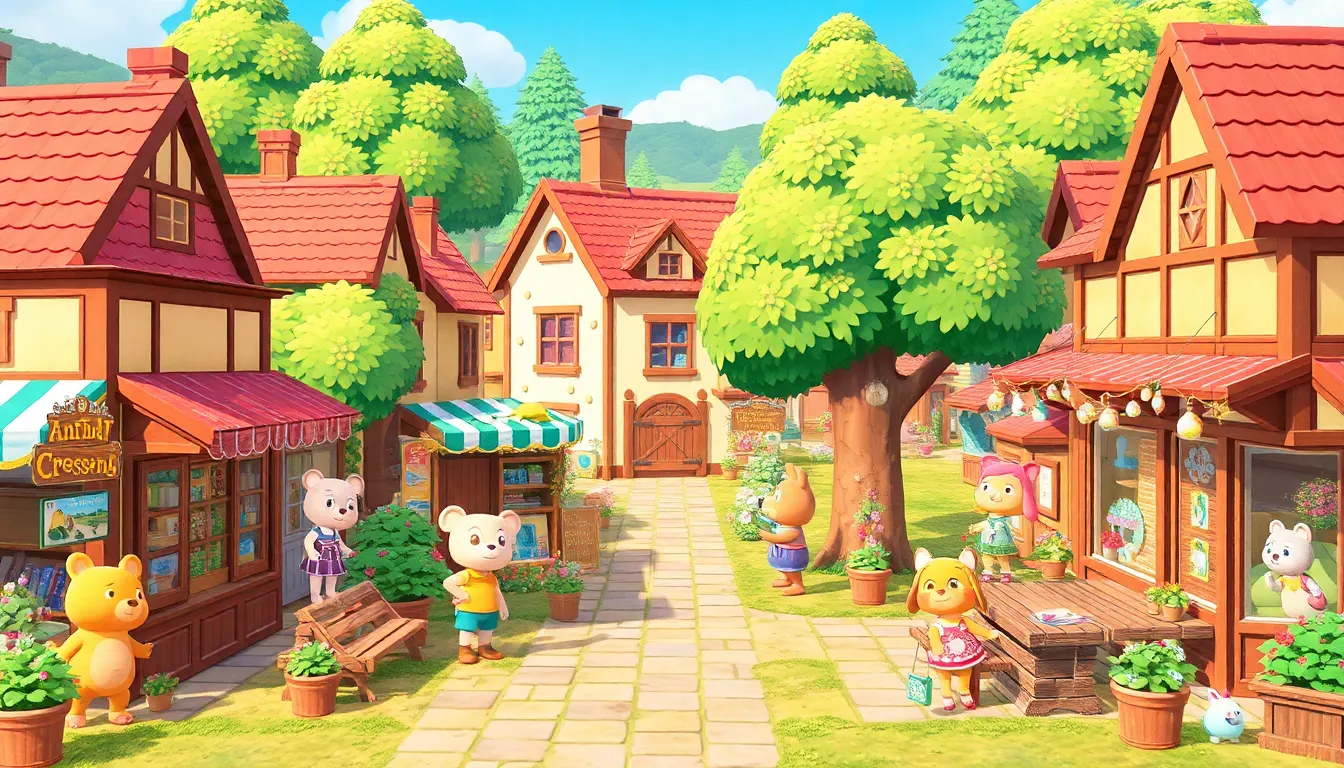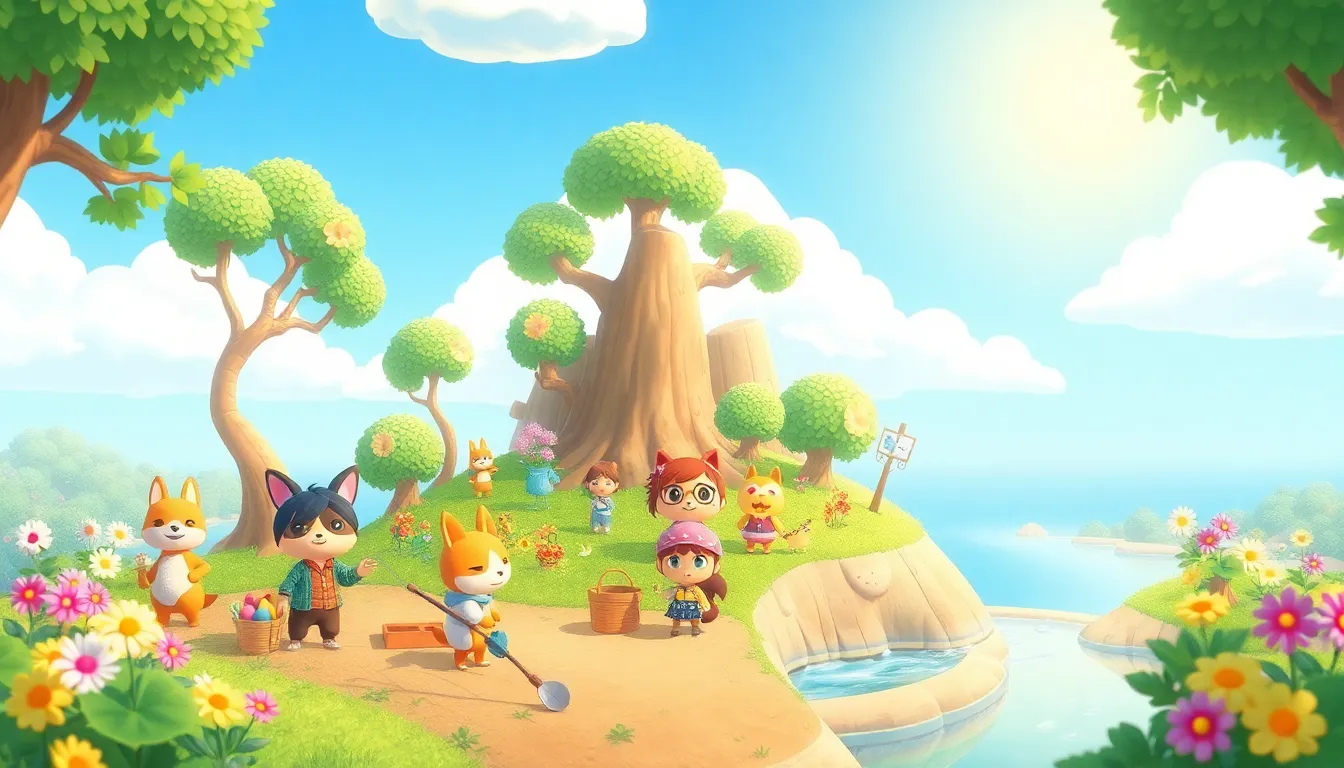In a world where life can feel like a never-ending race, Animal Crossing swoops in like a friendly villager offering a cup of coffee and a cozy chair. This beloved game invites players to escape reality and create their own slice of paradise, but when did this charming adventure first capture our hearts?
Launched in Japan on April 14, 2001, Animal Crossing kicked off a phenomenon that would have players trading turnips and befriending anthropomorphic animals for years to come. Fast-forward to today, and this delightful franchise has evolved into a cultural staple, proving that sometimes, the best way to unwind is by fishing, gardening, and decorating your virtual home. So grab your net and let’s dive into the history of Animal Crossing—because who wouldn’t want to know when it all began?
Table of Contents
ToggleOverview of Animal Crossing
Animal Crossing serves as a charming video game series developed by Nintendo. It first launched in Japan on April 14, 2001, under the title “Doubutu no Shima.” Players assume the role of a character moving to a deserted island or rural village populated by anthropomorphic animals. Engaging in this picturesque world involves activities like fishing, bug catching, and gardening.
The game’s unique real-time clock system mirrors the actual time, creating a dynamic environment that reflects changing seasons and festivities. Through the years, various installments have introduced innovative features, enhancing gameplay experiences. New Horizons, released on March 20, 2020, marked a significant evolution in the series, allowing greater island customization and multi-player interactions.
Animal Crossing emphasizes community and relationships with non-playable characters. The inclusion of anthropomorphic animals builds connections, fostering a sense of belonging. Players often find themselves deeply immersed in their virtual communities, forming bonds with their in-game neighbors.
The trading mechanics, such as turnip trading for profit, create engagement and interaction among players. Through online platforms, players worldwide share tips and visit each other’s islands, expanding the game’s social aspect. Over time, Animal Crossing has transcended gaming, influencing pop culture and everyday life. Its calming atmosphere and playful design cultivate a space for relaxation and creativity, resonating with millions of fans.
Release Timeline

The Animal Crossing series has a well-documented history of release dates that marks its journey through gaming culture.
Original Release Date
Animal Crossing first debuted on April 14, 2001, in Japan under the name “Doubutu no Shima.” Following its initial release, it gained immediate popularity among players seeking a unique gaming experience. North America received the game later, launching on September 15, 2002. The European audience got their hands on it on March 14, 2003. These releases laid the foundation for a franchise that continues to engage players with its innovative gameplay.
Subsequent Versions
Various versions of Animal Crossing followed the original release, enhancing the gaming experience for players. Animal Crossing: Wild World launched on November 5, 2005, introducing mobile gameplay through the Nintendo DS. Afterward, Animal Crossing: City Folk was released on November 16, 2008, expanding the game’s universe with more urban settings. Animal Crossing: New Leaf arrived on June 9, 2013, further innovating with player-defined roles and new customization options. The most recent installment, Animal Crossing: New Horizons, came out on March 20, 2020, offering players an immersive island experience with advanced functionality and multiplayer features.
Impact on Gaming Culture
Animal Crossing has significantly shaped gaming culture, creating lasting effects on player connections and game development practices.
Community and Multiplayer Features
Engagement fosters community in Animal Crossing. Players share experiences, trade items, and visit each other’s islands, highlighting collaborative gameplay. With the introduction of online features, friendships flourish beyond localized interactions. Global connections invite players to exchange tips and showcase creativity. This social dynamic encourages regular participation, making gameplay deeply rewarding. Unique events and seasonal updates maintain excitement, bringing everyone together in the virtual world. Multiplayer elements transform a solitary experience into a joyful communal activity, enhancing the game’s appeal.
Influence on Game Design
Animal Crossing has influenced game design by emphasizing open-world exploration and player agency. Designers incorporate real-time elements to create immersive environments that respond to seasons. Customization options empower players, allowing for personal expression and creativity. Many games now feature non-linear gameplay, promoting player-driven narratives. The balance between relaxation and engagement poses a unique model for game developers. Animal Crossing showcases how interactive experiences can evoke emotional attachment without traditional competitive mechanics. This innovative approach has set new standards in the industry, inspiring future releases and franchises.
Critical Reception
Animal Crossing received widespread acclaim since its initial release. Reviewers praised its charm and innovative gameplay, recognizing its impact on the gaming landscape.
Reviews and Ratings
The original game achieved a score of 87 out of 100 on Metacritic, reflecting its positive reception. Subsequent titles consistently garnered similar scores, with Animal Crossing: New Horizons earning a remarkable 90 and above across multiple platforms. Players celebrated the freedom to design and customize islands, leading to engaging user experiences. Critics noted that the game’s enchanting visuals and soothing soundtrack contributed significantly to its appeal. Reviewers highlighted the series’ ability to invoke nostalgia while still offering fresh content, creating a unique gaming experience that resonates with a wide audience.
Awards and Recognitions
Animal Crossing has secured numerous awards throughout its history. The series won the prestigious “Best Family Game” award from the Game Awards multiple times, recognizing its suitability for players of all ages. Animal Crossing: New Horizons was particularly noted for its innovative design, earning accolades such as the “Best Game” at the 2020 Golden Joystick Awards. Recognitions also include distinctions from several gaming publications, which highlighted its contribution to community engagement and creative expression within the digital landscape. The ongoing praise underscores its status as a cultural phenomenon within gaming.
Animal Crossing’s journey since its debut in 2001 has been nothing short of remarkable. With each new installment the series has captivated players by creating immersive worlds filled with charm and creativity. The innovative gameplay features and community-driven experiences have established a loyal fan base that continues to grow.
As the series evolves it remains a beloved staple in the gaming landscape. Its ability to foster connections among players while providing a relaxing escape sets it apart from other titles. The impact of Animal Crossing on gaming culture and design is undeniable, ensuring its place in the hearts of millions for years to come.




